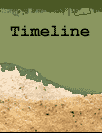


|
1918 |
The Ottoman Empire's German allies are defeated, marking the end of World War I. |
|
1920 |
The Treaty of Sèvres is signed between the Ottoman Empire and the European Allies, giving the Kurds a chance to form an independent nation, if they so desire, and if they have the ability. |
|
1923 |
Mustafa Kemal (Attatürk) comes into power and expands Turkish military strength. |
|
July
24, 1923 |
The Treaty of Lausanne comes into effect, replacing the Treaty of Sèvres. |
|
1924 |
Mustafa Kemal decides to nullify the Islam Caliphate, destroying the bond that has tied the Kurds and Turks together for centuries. |
|
1925 |
The Kurds rebel against the Turkish republic, but are brutally defeated by the Turkish army. |
|
1946 |
The Mahabad Republic is formed by the Iranian Kurds with the help of the Soviet Union. But this short-lived state is soon demolished by the Iranians. |
|
May, 1961 |
Leyla Zana is born the daughter of a peasant in Bache, a town near the Kurdish city of Diyarbakir, Turkey. |
|
1976 |
At fifteen, Leyla marries Mehdi Zana, who is more than twice her age, and is also a cousin of her father. |
|
November, 1978 |
The PKK is established by Abdullah Öcalan and twelve of his followers. |
|
September 12, 1980 |
A coup d’etat occurs in Turkey, and Kurdish rights are set aside in the struggle for unity. Mehdi Zana is jailed for his political views and activism, and Leyla is forced to support herself and her young son, make decisions, and develop her own opinions. |
|
1980s |
Zana establishes and heads a group advocating the rights of women, which comes to have locations in both Diyarbakir and Istanbul. She is an active member of the Human Rights Association, and is both a writer for and afterwards the editor of the newspaper Yeni Ulke. |
|
1988 |
Zana goes to see her husband in a Turkish jail, but is not admitted, and can hear the prisoners being abused inside. She participates in an uprising along with other visitors, and is arrested and held in custody for 57 days. During the first week of her incarceration, she is questioned and suffers brutal torture. |
|
1991 |
Gulf War ends, the Kurds revolt against Saddam Hussein in Baghdad. ‘Operation Provide Comfort’ for Kurds came into effect. |
|
1991 |
The Social Democratic Populist Party, or SHP, orders that Zana and Hatip Dicle leave the group, Zana for her inauguration oath, and Dicle for calling attention to the combatant nature of Turkey's Constitution. Both ignore this command. |
|
October, 1991 |
Having won the support of 84 percent of voters in her area of Diyarbakir, Leyla Zana becomes a member of Turkish Parliament. |
|
March 2, 1992 |
SHP is dormant after the slaughter of one hundred non-militant Kurds by Turkish soldiers during Newroz, or New Year's, festivities in Cizre. Leyla Zana, Hatip Dicle, and other former SHP members organize a new political group: the HEP, or People's Labor Party.May of 1993- DEP (The Democracy Party) is formed, and eventually comes to replace HEP |
|
May, 1993 |
In Washington D.C., Leyla Zana and her colleague Ahmet Turk, a fellow Kurd and member of Parliament, address those present at the Carnegie Endowment for International Peace, and also the members of Congress at the Helsinki Commission. |
|
August, 1993 |
Turkish Constitutional Court bans HEP for inciting division. |
|
September 4,
1993 |
Kurdish Parliamentarian and DEP-member Mehmet Sincar and DEP-chairman Metin Özdemir are shot and killed, having been abandoned by their police escort. Nizamettin Toguç, who was with them at the time of the attack, is injured. |
|
September,
1993 |
Two attempts at Zana’s assassination are made. |
|
May 11, 1994 |
HADEP (The People’s Democracy Party), which eventually succeeds the DEP, is organized |
|
March 3, 1994 |
The Kurdish MPs are arrested for accounts of treason and separatist activities and participation in the PKK, violating article 168 and 169 of the Turkish penal code. |
|
June, 1994 |
DEP is declared to be illegal |
|
March 2, 1994 |
A ban protecting Parliament members from seizure is suddenly lifted, after HEP visits to Paris, Strasbourg, and Brussels, to describe the crisis in Turkey. Leyla Zana, Hatip Dicle, Orhan Dogan, and Selim Sadak are taken into custody and charged with unlawful actions, treason, and inciting division, and are sentenced to15 years of their lives being spent in the custody of their country. |
|
1999 |
Abdullah Öcalan is arrested; he persuades his followers to peacefully protest. |
|
2002, 2003 |
In the hopes of finally gaining entrance into the EU, Turkey's government abolishes several laws, including those denying Kurds the right to be independently taught in their own language and to name their children whatever they so choose, including Kurdish names. All citizens of Turkey are now allowed reconsideration of cases the EU finds to have been conducted unjustly. |
|
2004 |
Prime Minister Recep Tayyip Erdogan comes to Boston and talk about a future democratic Turkey. |
|
April 21, 2004 |
The verdict of the Kurdish MP’s 14th retrial is decided: the four are to remain in prison. |
s